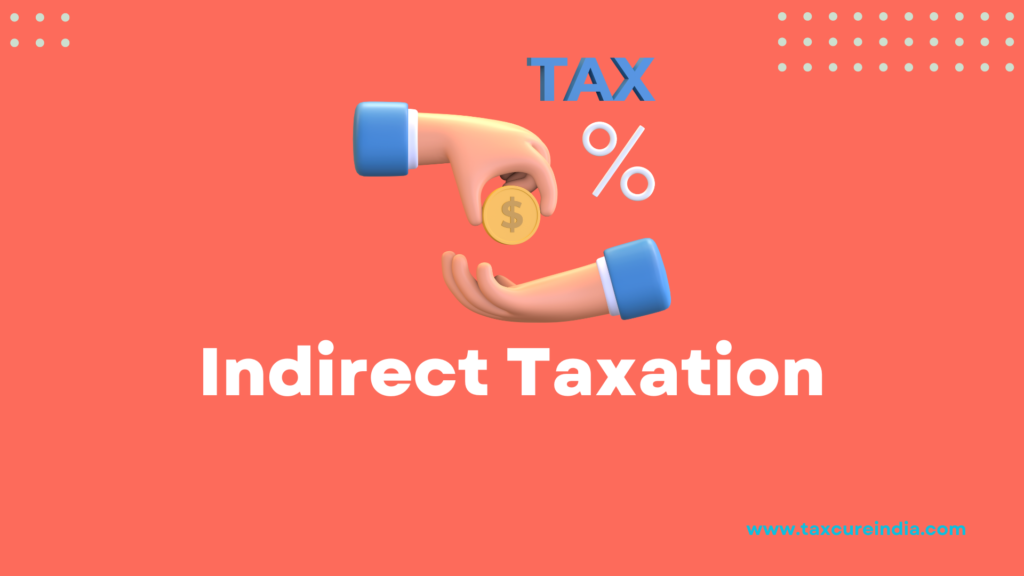Indirect Taxation
Tax that is paid to the government by one entity in a supply chain, but is passed on to the consumer as part of the price of goods or services is known as indirect taxation. The end consumer is paying more tax for the product. Indirect tax is shifted from one taxpayer to another.

ADVISORY INDIRECT TAXATION
- Advising Individuals, Companies and Firms on Planning.
- Indirect Tax Management- Registration, renewals, periodic returns and compliances.
- Appeals Liaison with senior tax counsel for cases at Tribunal and High Court and for legal opinions.
What is Indirect Tax?
Indirect tax is a tax that can be passed on to another individual or entity. Indirect tax is generally imposed on suppliers or manufacturers who pass it on to the final consumer.
Examples of an Indirect Tax
- Excise Duty
- Customs Duty
- Entertainment Tax
- Service Tax
- Sales Tax
- Gross Receipts Tax
- Value-Added Tax (VAT) are examples of Indirect taxes.
An example of GST (Indirect tax)
Let’s say you eat at a restaurant. You could see your entire payment plus the GST on the bill (Indirect tax).
The GST rate is 5%, so let’s say the total was Rs.2500. Then, you will be required to pay Rs.1050 (1000+50). The service provider passes on the indirect tax to you in the amount of Rs.50.
Types of Indirect Taxes
- Service tax: This tax is levied by an entity in return for the service provided by them. The service tax is collected by the Government of India and deposited with them.
- Excise duty: When any product or good is manufactured by a company in India, then the tax levied on those goods is called the Excise Duty. The manufacturing company pays the tax on the goods and in turn recover the amount from their customers.
- Value Added Tax: Also known as VAT, this type of tax is levied on any product sold directly to customer and are movable. VAT consists of Central Sales Tax which is paid to the Government of India State Central Sales Tax which is paid to the respective State Government.
- Custom Duty: This a tax levied on the goods imported to India. Sometimes, Custome Duty is also levied on products which are exported out of India.
- Stamp Duty: This is a tax levied on the transfer of any immovable property in a state of India. The state government in whose state the property is located charges this type of tax. Stamp tax is also applicable on all legal documents too.
- Entertainment Tax: This tax is charged by the state government and is applicable on any products or transactions related to entertainment. Purchasing of any video games, movie shows, sports activities, arcades, amusement parks, etc. are some of the products on which Entertainment Tax is charged.
- Securities Transaction Tax: This tax is levied during the trading of securities through Indian Stock Exchange.
Difference between Direct and Indirect Tax
A direct tax is a tax levied directly on a taxpayer and is paid straight to the imposing authority. An indirect tax is levied on goods and services and is paid by an individual to the intermediaries who then submit the tax to the government.
-
What is indirect tax with example?
Indirect tax is a type of tax that is passed on to another individual or entity.
-
What is difference between direct and indirect tax?
while direct tax is directly paid to the government, there is generally an intermediary for collecting indirect taxes from the end-consumer.
-
What are the six indirect taxes?
Examples of indirect taxes are excise tax, VAT, and service tax. Examples of direct taxes are income tax, personal property tax, real property tax, and corporate tax.
-
Is TDS indirect tax?
Tax Deducted at Source or TDS is an indirect type of tax.
-
Is GST direct or indirect tax?
Goods and Services Tax is a tax collected on the consumption of goods or services therefore, it is an indirect tax. It is divided into two parts, one that is distributed equally between the centre and the state in the form of the Central GST (CGST) and State GST (SGST).
-
What are Common Types Of Indirect Taxes in India?
Service tax. This tax is levied by entities for rendering services like consulting, legal, and other such services. …
Excise duty
VAT
Customs duty
Securities Transaction Tax (STT)
Stamp duty
Entertainment tax

